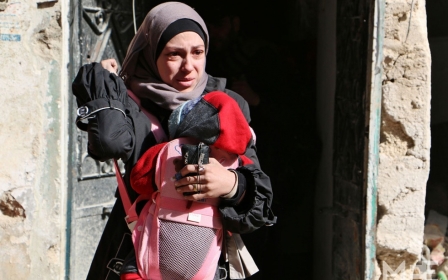UN Syria resolution to assist 4.7 million in need

The UN Security Council adopted a resolution Monday authorising humanitarian convoys to Syria without the consent of Bashar al-Assad’s government, in order to help more than one million civilians in rebel-held areas.
The council, which includes Russia and China, have vetoed four Western-backed draft resolutions on Syria since the start of the conflict in 2011, but have unanimously approved this measure.
The resolution outlines how humanitarian convoys would pass through four border crossings on the borders with Turkey, Jordan and Iraq.
The shipments will travel through two border crossings in Turkey (Bab a-Salam and Bab al-Hawa), one in Iraq (Al-Yarubiyah) and another in Jordan (Al-Ramtha).
All three neighbouring countries are also hosting large numbers of refugees from the conflict.
British Ambassador Mark Lyall Grant told the council: "It marks a major step forward in the international community's effort to respond to the suffering in Syria."
The UN’s humanitarian agency OCHA estimates that cross-border access could allow the UN to reach between 1.3 million and 2.5 million more people, mostly in rebel-controlled areas
Australian ambassador Gary Quinlan described the situation in Syria as “the greatest humanitarian crisis this century” with between 6,000 and 7,000 new refugees created every day. “At least one family in Syria becomes displaced every minute,” he said.
More than 10.8 million Syrians are in need of aid, according to UN officials, who have accused Damascus of impeding deliveries of life-saving supplies.
British Foreign Secretary William Hague said the resolution would put an end to Syrian President Bashar al-Assad's "stranglehold" on aid routes.
"Many vulnerable communities remain completely besieged because of the regime's starve or surrender tactics. So this process of cross-border aid delivery must start without delay," said Hague.
A coalition of 34 NGOs, including Save the Children, the Norwegian Refugee Council and Oxfam, welcomed the resolution as “rare consensus” among the five permanent Security Council members and called for a "massive increase" in aid for 11 million Syrians.
No permission needed
The draft resolution - sponsored by Australia, Luxembourg and Jordan - had been the focus of tough negotiations for five weeks, with Moscow insisting that the Syrian government be given some rights to monitor the convoy movements.
Under the measure, which is valid for six months, convoys will be monitored by UN teams who will simply inform the Syrian government of the shipments but will not seek permission for the deliveries.
Syria has warned in a letter to the UN Security Council last month that it would consider any enforced cross-border delivery of humanitarian aid without its consent as an "attack" on the state.
Syrian Ambassador Bashar Jaafari told the council that Damascus welcomed "sincere efforts to ease the burden" of suffering but stressed that the aid would not be efficient without measures to combat "terrorist groups" - a reference to rebel groups.
International aid agencies welcomed the move as a potential lifeline for Syrians and said the diplomatic breakthrough must translate into action on the ground.
"If implemented correctly, this is a potential game changer," said Jan Egeland, of the Norwegian Refugee Council, a member of a coalition of 34 non-governmental organisations that welcomed Resolution 2165.
With nearly 11 million Syrian people in need, and the humanitarian situation worsening by the day, the progress made in New York "must now lead to a massive increase in aid to those who need it," they said in a joint statement released by the organisations, including Oxfam and Save the Children.
More than 160,000 people have died in the Syrian war, with UN peace efforts so far failing to make any headway.
UN Secretary General Ban Ki-moon called on “all parties to the conflict and those with influence over them” to allow unconditional humanitarian aid.
And last week named Italian-Swedish diplomat Staffan de Mistura to take up the tough job of UN mediator after Lakhdar Brahimi resigned in May over the failure of recent peace talks.
A Security Council resolution passed in February to allow aid distribution has been ignored and Assad’s government has insisted on aid being channelled through Damascus, with very little subsequently reaching civilians in areas not controlled by the government
Stay informed with MEE's newsletters
Sign up to get the latest alerts, insights and analysis, starting with Turkey Unpacked
Middle East Eye delivers independent and unrivalled coverage and analysis of the Middle East, North Africa and beyond. To learn more about republishing this content and the associated fees, please fill out this form. More about MEE can be found here.




